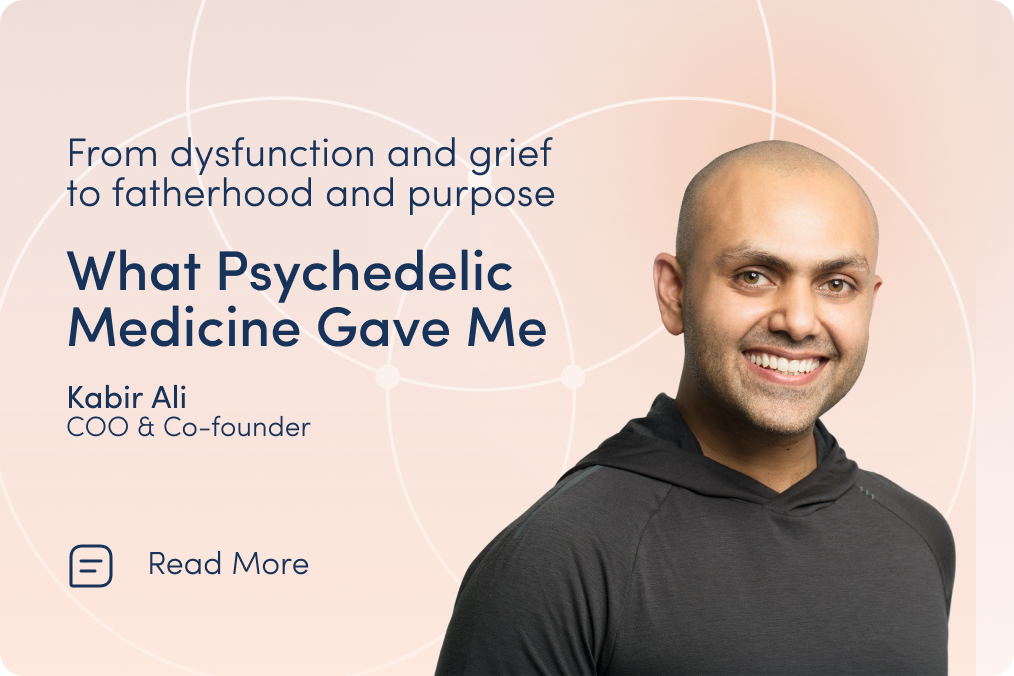
Understanding Palliative Care: A Holistic Approach to Serious Illness with Dr. John Horton
Palliative care is often misunderstood due to misconceptions and stigma surrounding death and serious illness. In a recent conversation with our founder and medical director, Dr. Houman Farzin, a palliative care physician at McGill, and clinical advisor Dr. John Horton, a psychiatrist and palliative care physician at UCLA, explored what palliative care truly means and how it can enhance the quality of life for patients and their families. In this post, we will break down palliative care's core principles, impact, and growing role in psychedelic medicine.
What is Palliative Care?
Dr. Houman describes palliative care as “a comprehensive approach focused on improving the quality of life for patients and families facing serious illnesses. ” Aligning with the World Health Organization, this definition emphasizes that palliative care is not just about symptom management but also about addressing the psychological, emotional, and spiritual needs of patients. Dr. Horton stressed the importance of “centering patients' quality of life, symptom management, coping mechanisms, and family well-being from day one. ” By focusing on all these aspects, we can approach and treat patients in a holistic and comprehensive way.
A key aspect of palliative care is its collaborative approach. Dr. Horton described it as “a team sport, ” involving professionals from nursing, social work, pharmacy, spiritual care, and medicine. This interdisciplinary model ensures that patients receive well-rounded, compassionate support. Reflecting on his first experience in a palliative care setting, Dr. Horton was struck by how deeply the team focused on understanding the patient’s experience and improving their quality of life. Dr. Houman further emphasized this, by sharing his own experience during residency, “ what really stood out to me was the quality of care and the quality of the healthcare professionals and how they treated themselves, the patients, and us the trainees, with a lot of dignity and respect, something that was often lacking in many other specialties. ” This patient-centered, compassionate approach creates a supportive environment that benefits everyone involved in care.

The Power of Palliative Care
Palliative care can improve a patient's well-being at any point during treatment, but introducing palliative care early in the course of an illness can make an even bigger difference. Dr. Houman emphasized, “Ideally, palliative care should start at diagnosis… The research that exists backs the fact that patients who receive early palliative care end up doing better in their cancer treatment and my personal clinical experience definitely validates that. ” Dr. Horton added that starting palliative care at day one “gives us a huge opportunity to be partners through the good and through the bad, to be there for all of it, and that's a real privilege. ”
Palliative care emphasizes an important point, that a patient’s success is not just about medical results but about how patients navigate their journey, their goals, and overall quality of life. Dr. Houman noted, “Patients dealing with cancer and cancer treatments, with all the appointments, procedures, and side effects and all the fear from every single diagnostic test, benefit from having a professional that is just there focused on their well-being… focused on the quality of their experience. Their success isn't just based on the test result, but how are they moving through this journey and I think that's the beauty of palliative care. ” Palliative care is a powerful speciality because it allows clinicians to truly understand patients’ experiences, their suffering, and to help their patients find opportunities for presence and meaning.
The Role of Psychedelics in Palliative Care
Beyond physical symptoms, serious illnesses often bring existential and spiritual distress. Patients may struggle with questions of meaning and purpose. Dr. Horton, who works extensively with patients facing cancer diagnoses, pointed out that many do not respond to conventional antidepressants or anxiety medications. He and Dr. Houman agreed that traditional treatments often fail to address the deep suffering and loneliness experienced by those with serious illnesses. Dr. Horton noted, “These concerns push us to find the right kinds of interventions. ” This is where psychedelic assisted therapy may offer a new path to healing.
Dr. Houman explained, “The experiences created during psychedelic therapy are profoundly meaningful and often life-changing. ” He highlighted how psychedelics help patients process existential fears, grief, and emotional distress in ways that conventional treatments cannot. Unlike traditional medications that primarily aim to suppress symptoms, psychedelic-assisted therapy can bring patients into direct contact with deeply held emotions and unresolved trauma, fostering a sense of peace, clarity, and acceptance. Dr. Houman noted that many individuals who go through psychedelic assisted therapy, report a renewed sense of connection, to themselves, to others, and to something greater, which can ease the psychological suffering that often accompanies terminal illness. In the context of palliative care, these insights can be transformative, offering a kind of long-lasting healing that is emotional, spiritual, and relational, not just physical.
A particular focus of their discussion was ketamine, which has been used in medical settings for years. Dr. Horton pointed out that ketamine is not a new or experimental drug but an established treatment with a strong safety profile. Initially used as an anesthetic, ketamine has demonstrated powerful antidepressant effects. When combined with psychotherapy, it can help patients and caregivers find relief and transformation. Dr. Houman described it as “a catalyst for healing, ” allowing patients to process their experiences in a meaningful way. Ketamine’s ability to rapidly shift mood and perception, as well as increasing neuroplasticity in the brain, creates a critical window for therapeutic breakthroughs, especially for those facing end-of-life distress.
The Ripple Effect of Compassionate Care
While palliative care focuses on patients, it is just as important to support their caregivers and families. Dr. Horton emphasized that caregivers also experience emotional and psychological distress and that helping and supporting caregivers and families indirectly benefits patients. He stated, “If we provide care for caregivers, we’re also helping our patients. ” Dr. Houman agreed, stressing that healing is relational and that involving loved ones in therapy is crucial. The emotional toll of witnessing a loved one suffer can be overwhelming, and caregivers often neglect their own well-being in the process. By including them in the therapeutic journey, whether through joint sessions, education, or by sharing access to supportive resources, clinicians can foster a more resilient and compassionate care environment. When caregivers feel seen, supported, and equipped, they are better able to show up for their loved ones in meaningful and sustainable ways.
Palliative care is more than a medical specialty, it’s a philosophy rooted in compassion, presence, and the full spectrum of human experience. It honors not just the physical needs of patients, but also their emotional, spiritual, and relational well-being. Through the thoughtful integration of psychedelic therapies, practitioners like Dr. Houman and Dr. Horton are expanding the possibilities of what healing can look like, even in life’s most difficult chapters. Their work reminds us that when we approach care holistically, from the mind, body, and heart, we create space for meaning, connection, and even transformation for patients at all stages of life.

Mystic Health Blog

FAQs
1. Am I eligible for ketamine therapy?
2. Does insurance cover the cost of ketamine therapy?
3. How many ketamine treatments will I need?
We recommend two initial treatments to determine suitability and adjust dosage. After these sessions, additional treatments are available based on your progress and specific requirements.









